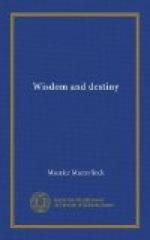Some ideas there are that lie beyond the reach of any catastrophe. He will be far less exposed to disaster who cherishes ideas within him that soar high above the indifference, selfishness, vanities of everyday life. And therefore, come happiness or sorrow, the happiest man will be he within whom the greatest idea shall burn the most ardently. Had fate so desired it, Antoninus also, perhaps, had been guilty of incest and parricide; but his inward life would not have been crushed thereby, as was that of Oedipus; nay, these very catastrophes would have given him mightier strength, and destiny would have fled in despair, strewing the ground by the emperor’s palace with her nets and her blunted weapons; for even as triumph of dictators and consuls could be celebrated only in Rome, so can the true triumph of Fate take place nowhere save in our soul.
17. Where do we find the fatality in “Hamlet,” “King Lear,” in “Macbeth”? Is its throne not erected in the very centre of the old king’s madness, on the lowest degree of the young prince’s imagination, at the very summit of the Thane’s morbid cravings? Macbeth we may well pass by; not need we linger over Cordelia’s father, for his absence of consciousness is all too manifest; but Hamlet, Hamlet the thinker—is he wise? Is the elevation sufficient wherefrom he looks down on the crimes of Elsinore? He seems to regard them from the loftiest heights of his intellect; but in the light-clad mountain range of wisdom there are other peaks that tower far above the heights of the intellect—the peaks of goodness and confidence, of indulgence and love. If he could have surveyed the misdeeds of Elsinore from the eminence whence Marcus Aurelius or Fenelon, for instance, had surely surveyed them, what would have resulted then? And, first of all, does it not often happen that a crime which is suddenly conscious of the gaze of a mightier soul will pause, and halt, and at last crawl back to its lair; even as bees cease from labour when a gleam of sunshine steals into the hive?




